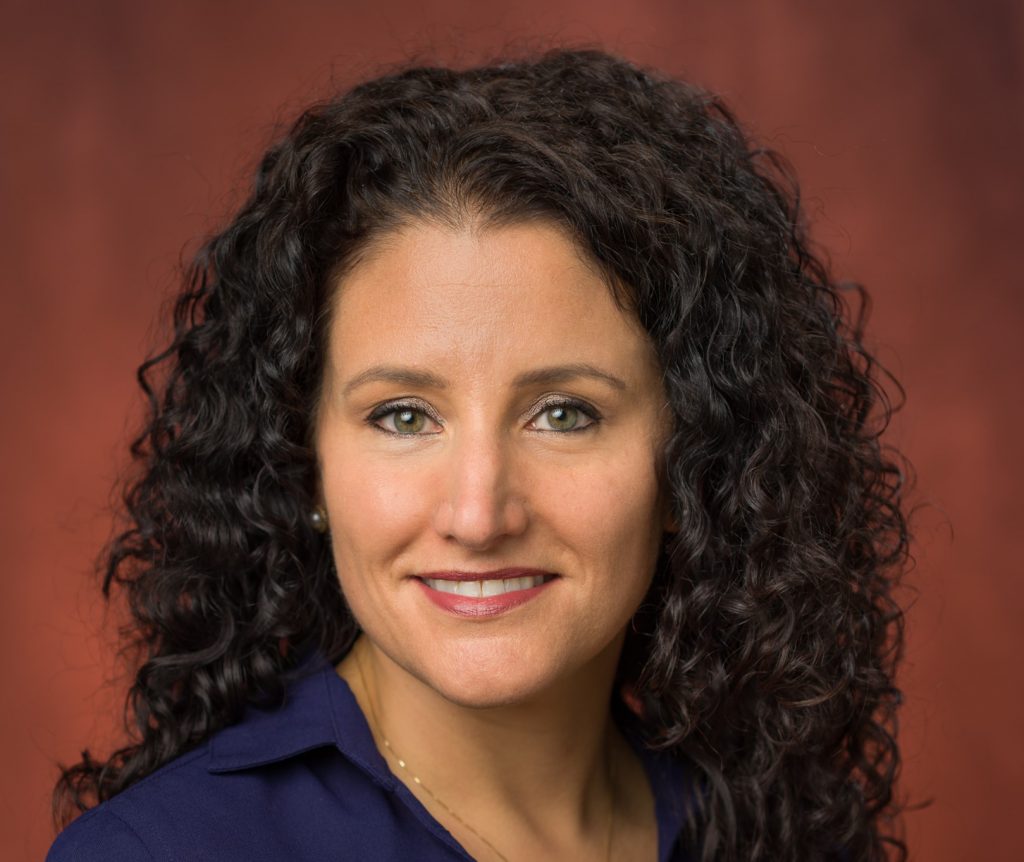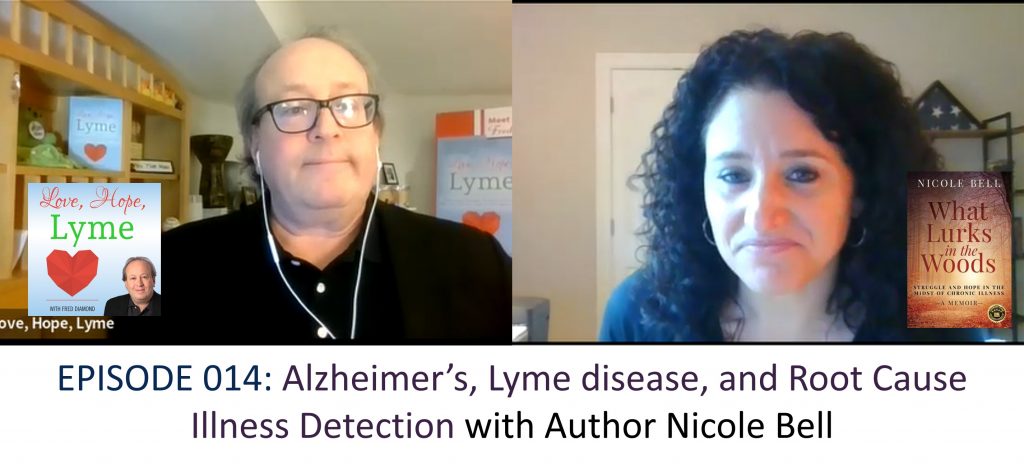PODCAST: Alzheimer’s, Lyme disease, and root cause detection

By Fred Diamond
When I was researching for my book “Love, Hope, Lyme: What Family Members, Partners, and Friends Who Love a Chronic Lyme Survivor Need to Know,” one thing that I found shocking was how difficult it was for persistent Lyme survivors to get a proper diagnosis. It was astounding that people had to virtually become detectives to figure out what was ailing them.
On this week’s Love, Hope, Lyme podcast, Nicole Bell, the author of “What Lurks in the Woods” discusses her journey to understand how Lyme disease led to her husband’s early on-set Alzheimer’s disease and eventual passing. Along the way, she learned where the medical profession fell short and why getting to the root of chronic illness can make all the difference.
Her husband Russ began having mood disorders and memory loss. Although he was an outdoorsman and was frequently in the woods, tests for Lyme came back negative. Eventually, a neurologist diagnosed him with early on-set Alzheimer’s disease, which she found perplexing. An engineer by trade, Nicole began journaling to help her process how quickly her husband’s health was deteriorating.
The journaling eventually led to her book. Since the book came out, she’s been active in Lyme disease research and has co-authored a policy paper that made recommendations for funding research for a cure for Lyme and other tick-borne diseases. (Note: On Nov. 30, Nicole will explain those recommendations in a free webinar.)
“I wanted to make order of the chaos and document all the learnings, failures, successes, and the things that we did along the way. If one person could pick up my book and say, ‘Wow, I’m not going to do that,’ or, ‘I am going to do this,’ and it makes their journey that much easier, then that brings meaning to the whole experience.”
The Lyme tie to Alzheimer’s
Nicole said there are multiple causes of Alzheimer’s but in Russ’s case, tick-borne illnesses were the root cause. “If you look deeply into Alzheimer’s research, it can be a metabolic disorder, it can be a hormone disorder, or it can be infection. He had Bartonella and he had heavy metals in his brain, and those can lead to neurodegeneration.”
Their medical journey was not dissimilar from the journeys I’ve heard from many other persistent Lyme survivors.
“We went to four different neurologists and two different functional medicine practices. Many diagnoses are often just symptoms and not the real issue. A lot of the diagnoses are idiopathic, which means they have no idea what’s causing it. The fundamental challenge in the next layer of medicine is trying to figure out what’s causing a lot of these illnesses.”
“His first manifestations were all mood-based. He became depressed, irritable, nasty, and verbally abusive. I thought we were headed for divorce. Then, I realized his memory was also suffering, and I knew it wasn’t just our life situation, it wasn’t just his unhappiness, and it was something pathological,” she said.
Advice for caregivers
She said she learned three things about caregiving.
“Chronic Lyme is real. At some point in your journey, you’re going to question it. I know I did. There’s so much misinformation out there. There’s going to be a doctor, or a family member, or even a news article that just makes you question what you’re doing, and if you’re on the right path?”
Nicole said she approached it as an engineer would and dove into the science. “There is a lot of research that has emerged over the last decade that shows that these infections are stealthy and difficult to treat, and that not everybody gets rid of the infections with treatment. That leads to a host of chronic dysfunction.”
“Getting well takes work. We have this expectation in society that we go to the doctor, we get a pill, we come out and we’re better, and that is just not the case with chronic illness. You’re going to need to make lifestyle changes in diet and sleep. You may have to pick up meditation and mindfulness practices. It is a full-time job, especially if you’ve been sick for a while.”
One doctor kept reiterating to us, “It took you a long time to get this sick. It’s going to take a long time to get well.”
“And it is a rollercoaster that I was not prepared for. There are times when you think, I got this. We are good, we are on the right path. He or she is getting better, and everything is great,” she intimated. Then there’s going to be times when you are crying on your closet floor. There are ups and downs that you could have never fathomed or imagined.”
“And don’t expect your loved one to be who they were. I would think, why are you being so mean to me? Why are you confused? Why did you forget? His brain was literally rewired and in a different place. He had Bartonella and that made him angry, with rage and irrational thoughts. He was in a different place, and I needed to stop thinking of him the way that he was and meet him where he was at that moment,” she surmised.
The caregiver’s health may suffer too
She said a doctor told them that he’d take on her husband, but that she would need to be a patient as well.
“It’s a rollercoaster. But when you go to a rollercoaster, it’s over in a minute. But this is a rollercoaster that’s Ironman length. You’re on this journey for a while and it is emotionally intense. If you don’t take care of yourself, and if you don’t understand how to cope with some of the stress and how to manage what you’re trying to basically compensate for, then you’re going to become a patient too, and you’re not going to be able to help anybody.”
She said to think of yourself as a project manager. How are you going to fill the gap? How am I going to use the tribe around me, how am I going to ask for help so that I can get all these things done? Don’t be the person that throws it all in the backpack, like the Sherpa, trying to carry it all up the mountain. What’s the gap and how am I going to use the people around me to make sure that it’s done in a sustainable way that can last through the duration?
Learn more about Nicole’s work on understanding disease root cause analysis here.
Click here to listen to all episodes of the Love, Hope, Lyme Podcast or on YouTube.
Fred Diamond is based in Fairfax, Virginia, and can be contacted via Facebook. His popular book, “Love, Hope, Lyme: What Family Members, Partners, and Friends Who Love a Chronic Lyme Survivor Need to Know” is available on Amazon. The e-version of the book is always free to Lyme survivors. Contact Fred via Facebook private message for your copy.





















We invite you to comment on our Facebook page.
Visit LymeDisease.org Facebook Page